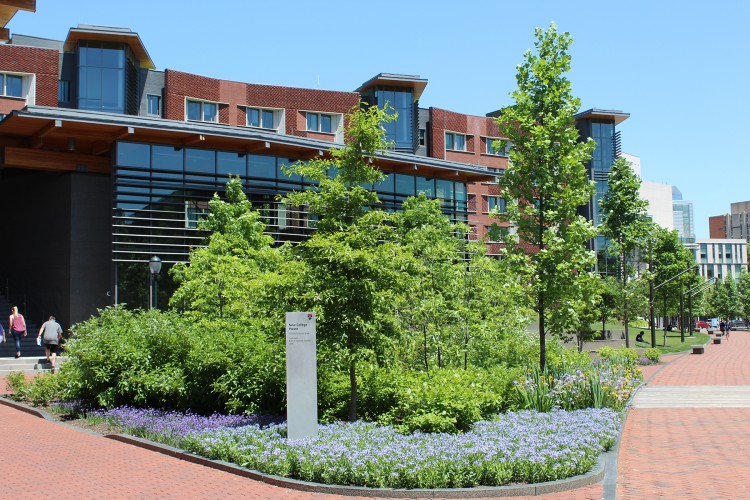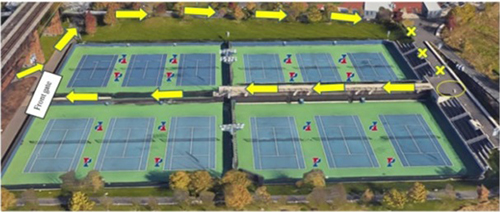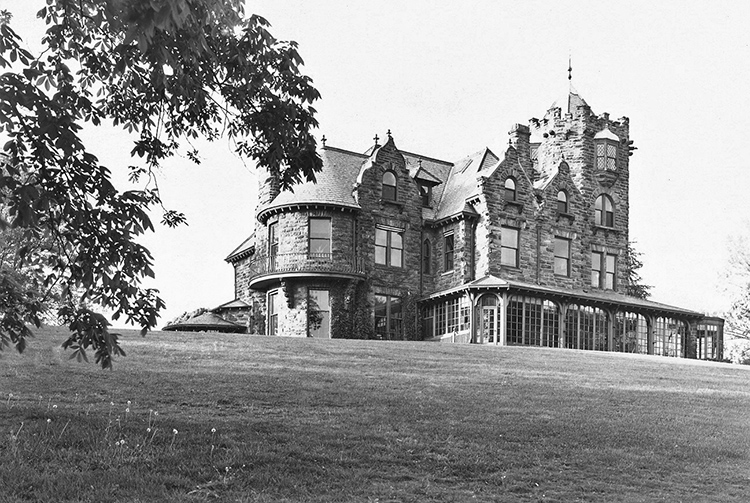Gift from Ofer Nemirovsky Establishes NEMO Prize, César de la Fuente: Inaugural Recipient


Earlier this year, Ofer Nemirovsky (EE’79, W’79), a managing director of HarbourVest Partners, LLC, a global private equity firm in Boston, donated $500,000 to the University of Pennsylvania’s Penn Health-Tech program to establish the Nemirovsky Engineering and Medicine Opportunity (NEMO) Prize. The goal of the prize is to encourage collaboration between the University of Pennsylvania’s Perelman School of Medicine and the School of Engineering and Applied Science by supporting early-stage innovative ideas at the intersection of engineering and medicine that might not receive funding from traditional sources.
The first recipient of this term prize, which includes an award of $80,000, is César de la Fuente, Presidential Assistant Professor in the departments of psychiatry, microbiology, and bioengineering. He proposed a paper-based COVID diagnostic system that could capture viral particles on a person’s breath, then give a result in a matter of seconds when taken to a testing site.
Similar tests for bacteria cost less than a dollar each to make. Dr. de la Fuente is aiming to make COVID tests at a similar price point and with a smaller footprint so that they could be directly integrated into face masks, providing further incentive for their regular use.
“Wearing a face mask is vital to containing the spread of COVID because, before you know you’re sick, they block your virus-carrying droplets so those droplets can’t infect others,” Dr. de la Fuente said. “What we’re proposing could eventually lead to a mask that can be infected by the virus and let you know that you’re infected, too.”
The proposed detection system would use dozens of tiny, 3D-printed electrodes seeded with fragments designed to bind to the SARS-COV-2 virus’ spike proteins. These electrodes would then be deposited on conductive paper, onto which a sample of respiratory droplets could be introduced. The electrodes’ overall resistance would go up as more viruses bound to the fragments, meaning the relative concentration of the virus could be instantaneously measured with a potentiometer.
Existing virus tests are based on assays of genetic material, which take more than 24 hours, require much more expensive equipment and reagents, and need to be conducted by trained technicians.
“With our proposal, a person could go to a testing site to see if their mask is infected, then follow-up with another kind of test if so,” Dr. de la Fuente said. He will use the NEMO Prize funds to begin developing the prototype for this paper-based coronavirus test, as well as other “blue sky” ideas for detecting pathogens, such as antibiotic-resistant bacteria. More research will also be required to further miniaturize the system so it can be integrated into face masks. Even without that advance, however, larger versions where samples were provided at dedicated testing sites would still be significantly faster and less expensive than current methods.
“The COVID-19 pandemic had a tremendous impact on the NEMO Prize,” said Glory Durham, associate director of Penn Health-Tech. “César’s proposal is an opportunity to develop a transformative technology that is sensitive and scalable. It is an excellent illustration of Penn Health-Tech’s mission to catalyze early stage innovation in medical technology across Penn.”
Mr. Nemirovsky focuses on sourcing, evaluating, and monitoring direct investments. He is also involved in HarbourVest’s business development efforts. He has been responsible for a number of HarbourVest’s direct investments, including Artisoft, AVID, AXENT, Centra, Clarus, Creo, Dendrite International, Digital Insight, eTapestry, Frame, Gilead, Insignia Solutions, Manugistics, Marcam, m-Qube, NETCOM On-Line, Progress Software, Radware, Retix, Shopzilla, SpectraLink, Ultimate Software, and UUNET. Mr. Nemirovsky’s previous experience includes four years in technical computer sales and marketing with Hewlett-Packard.
He received a BS in electrical engineering and a BS in finance from the University of Pennsylvania in 1979 and an MBA from Harvard Business School in 1986. He serves or has served on the Boards of the National Venture Capital Association, the Overseers of the School of Engineering of the University of Pennsylvania, the African Wildlife Foundation, and the Institute of Contemporary Art. Born in Israel, Mr. Nemirovsky is fluent in Hebrew.
Jessica Wachter: Inaugural Dr. Bruce I. Jacobs Professorship in Quantitative Finance
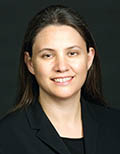 Jessica Wachter has been named the inaugural recipient of the Dr. Bruce I. Jacobs Professorship in Quantitative Finance, effective July 2020. A member of the Wharton faculty since 2003, Dr. Wachter researches asset pricing models that incorporate rare events and behavioral finance. She serves on the board of the Western Finance Association and as an associate editor of Quantitative Economics. Before coming to Wharton, she was an assistant professor at New York University’s Stern School of Business. Dr. Wachter holds a PhD in business economics and an undergraduate degree in mathematics from Harvard University.
Jessica Wachter has been named the inaugural recipient of the Dr. Bruce I. Jacobs Professorship in Quantitative Finance, effective July 2020. A member of the Wharton faculty since 2003, Dr. Wachter researches asset pricing models that incorporate rare events and behavioral finance. She serves on the board of the Western Finance Association and as an associate editor of Quantitative Economics. Before coming to Wharton, she was an assistant professor at New York University’s Stern School of Business. Dr. Wachter holds a PhD in business economics and an undergraduate degree in mathematics from Harvard University.
The Dr. Bruce I. Jacobs Professorship in Quantitative Finance was established in 2020 with a generous gift from Dr. Bruce I. Jacobs (G’79, GRW’86) and supports the appointment to Wharton’s finance department of faculty who are experts in quantitative finance (Almanac April 21, 2020).
Jonathan Zimmerman: Berkowitz Chair in Education
 Jonathan Zimmerman, a professor of the history of education in Penn GSE’s literacy, culture, and international education division, has been named the Judy & Howard Berkowitz Professor in Education. Considered one of the foremost education historians today, Dr. Zimmerman has been listed among Education Week’s annual Top 100 “Edu-Scholars” who influence public discussion in the US for the past decade (Almanac January 28, 2020).
Jonathan Zimmerman, a professor of the history of education in Penn GSE’s literacy, culture, and international education division, has been named the Judy & Howard Berkowitz Professor in Education. Considered one of the foremost education historians today, Dr. Zimmerman has been listed among Education Week’s annual Top 100 “Edu-Scholars” who influence public discussion in the US for the past decade (Almanac January 28, 2020).
Using the proceeds from the Berkowitz Chair, Dr. Zimmerman is launching the Berkowitz Fellowship in History of Education beginning Fall 2021. It will help fund a fifth year of study for doctoral students who are admitted in tandem to the Graduate School of Education and the School of Arts & Sciences department of history, where Dr. Zimmerman holds a secondary appointment. Berkowitz Fellows will receive a joint PhD in education and history, the only funded joint degree between a school of education and a history department in the United States.
Dr. Zimmerman is the author of seven books about the history of education, with two more appearing in the forthcoming academic year: The Amateur Hour: A History of College Teaching in America (Johns Hopkins University Press, October 2020) and Free Speech, and Why You Should Give a Damn, co-authored with Pulitzer Prize-winning cartoonist Signe Wilkinson (City of Lights Press, February 2021). Currently, Dr. Zimmerman is researching a book about how American schools and universities have experienced and addressed health epidemics over the past two centuries.
A public intellectual and journalist, Dr. Zimmerman is the author of over 500 op-ed articles and essays; his work is regularly published in The New York Times, New York Review of Books, Washington Post, Philadelphia Inquirer, and other popular newspapers and magazines. Many of his pieces connect history to our current educational circumstances or advocate for the preservation of free speech and the importance of hearing and understanding alternate viewpoints. Reflecting his commitment to the importance of diverse perspectives, Dr. Zimmerman was the recent winner of the 2019 Leadership Award from Heterodox Academy, the nation’s largest organization dedicated to viewpoint diversity in American higher education.
Dr. Zimmerman has received book and article prizes from the American Educational Research Association, the Society for Historians of the Gilded Age and Progressive Era, and the History of Education Society, where he served as president 2009-2010. He is the co-editor of both the “Histories of American Education” book series at Cornell University Press and the “History and Philosophy of Education” book series at University of Chicago Press. He has received several research awards from the Spencer Foundation, one of which also supported a kickoff conference for his University of Chicago book series.
Prior to joining the faculty of Penn GSE in 2016, Dr. Zimmerman was at New York University for 20 years. He directed New York University’s History of Education Program for 15 years and received NYU’s Distinguished Teaching Award, the university’s highest prize for teaching. His former PhD students have gone on to hold faculty positions at Brown University, Carleton College, City University of New York, the University of Texas, and dozens of other institutions. Dr. Zimmerman is also a former Peace Corps volunteer and secondary school social studies teacher.
The Judy & Howard Berkowitz Chair was endowed in 1995 with a gift from Judy and Howard Berkowitz. This chair was donated by the Berkowitz family in order to facilitate a study of ethnic relations, cultural pluralism, and diversity as they relate to education.
From the Provost and EVP: Update to Undergraduates on Plans for the Fall Semester
July 31, 2020
When we announced our plans for the fall semester last month, we indicated that we would provide updates as new information became available regarding the pandemic and the University’s operations. Today we write to provide you with the latest information on our plans for the coming academic year.
Since the onset of the COVID-19 pandemic, our University’s planning and actions have been driven by two fundamental principles: that we do everything within our powers to protect the health and safety of our students, faculty, staff, and community, and that we provide our students with the very finest educational experience possible under these extraordinary and challenging circumstances. As we began planning for the upcoming academic year, we were well aware that bringing college students together from across the country and around the world in the midst of a pandemic presented uniquely difficult challenges. This has become ever more apparent as the pandemic has continued to spread over the past month with young people becoming the fastest growing cohort.
In our message concerning the fall on June 25, we stressed that our decision was guided by the most current medical information and governmental directives, and cautioned that our plans could change depending on the progression of the pandemic. It is now evident that rather than plateauing during the summer, as many health experts expected, COVID-19 has instead gained momentum. Since our June 25 message, 1.5 million new cases of COVID-19 have been confirmed in the United States, with the confirmed case count soaring from 2.4 million on June 25 to 3.9 million on July 22. This means that almost 40% of all confirmed COVID-19 cases in the United States since the beginning of the pandemic have been reported in the last month.
Against this backdrop and as the pandemic continues to progress, the University’s planning has evolved on several fronts:
The Majority of Instruction Will Be Online
Undergraduate courses for the fall semester are being offered online, with a few, limited, in person offerings. For undergraduates in the Nursing School, the only in-person course work will be clinical simulations, experiences in the hospital, and clinical settings. For students in the other three undergraduate schools, a minimal number of courses will be offered in-person where it is essential to have an in-person experience in order to meet curricular and/or pedagogical requirements. Penn first-year international students can get a support letter from their academic school/department to confirm that they are attending a hybrid program in Fall 2020. If an in-person course is offered, accommodations will be provided for those studying remotely. Instructors may elect to come to campus for in-person office hours or to meet in person with students from time to time. These interactions are outside-the-classroom activities and comparable interactions will also be provided online.
Repeated COVID-19 Testing Required
One of the essential pillars of our reopening plan is testing for the virus. Penn will be requiring all undergraduate students who are returning to Philadelphia—regardless of whether they are living on or off-campus—to take a minimum of two COVID tests to participate as a member of the Penn community this fall.
Pre-Arrival Testing
We are now requiring that all students residing in the United States who plan to be on campus for the fall have a negative COVID-19 test within 14 days prior to arrival on campus. As a convenience to undergraduates and families, Penn has arranged with a private third-party testing laboratory for a COVID-19 testing kit to be delivered to each domestic student at their home address. These test kits contain detailed instructions. The kits also come with a postage paid envelope for return of the test to the testing laboratory.
If you intend to return to campus this fall, you must verify the address where your test kit will be shipped. This should be the location where you will be for the two weeks prior to your coming to Philadelphia. Please provide this shipping information in Penn InTouch as soon as possible, and no later than 5 p.m. Eastern Time on Sunday, August 2. When you receive the test, you will be given further instructions. Please follow the instructions closely. The test should be administered and returned as promptly as possible in order to ensure you receive the result prior to your departure for Philadelphia. The Announcements section in Penn InTouch will have additional details about shipping.
Once the test results are available, they will be provided to the University and the undergraduate via an app of the distributor of the test kit. If a student tests positive from the pre-arrival test kit, they should remain in isolation at home for 14 days from their test date. They should start all classes remotely until they can travel safely to Philadelphia after completing their isolation period.
Arrival Testing for Students Living On and Off-Campus
Upon arrival on campus, students will again be tested for COVID-19. All students who plan to live in on-campus housing, whether in college housing or Greek houses, will receive instructions prior to move-in, which will include an assigned date, time, and location to report first for an on-campus arrival test before moving into their on-campus residence. Students will be required to quarantine until they receive a negative test result. Accommodations and meals will be provided to students required to quarantine in college housing. The testing and move-in process will differ depending on the student’s assigned arrival date. In order to maintain a safe move-in process, there will be very limited exceptions for requests to adjust assigned dates and times.
Although undergraduates living in off-campus housing will not have assigned move-in dates, they will nevertheless be required to complete a COVID-19 arrival test. These students should coordinate with their roommates and landlords so that arrival in shared residences can occur over a series of days to minimize contact with others. All students, whether living on- or off-campus, are required to attest to the Student Campus Compact and to abide by all required testing, quarantine and isolation protocols and behavioral expectations. Students already in the Philadelphia area, and students not yet in Philadelphia who plan to live in off-campus housing, should register for their arrival test as early as possible. Details on registering will be provided shortly. Questions about the testing program can be sent to coronavirus@upenn.edu All student arrival testing needs to be completed no later than September 2, 2020. Failure to complete testing in a timely manner will result in restrictions to access to campus and/or academic resources.
Additionally, for international students and students arriving from states that are designated by the Pennsylvania Department of Health as hotspots, public health guidance from the Commonwealth of Pennsylvania and the Centers for Disease Control and Prevention (CDC) recommends quarantine for 14 days upon arrival to Philadelphia. To minimize risk of spreading COVID-19, the University will require all international students and students arriving from hotspot states to take an additional third test within five to seven days of when their first on-campus test was administered. The University will deliver meals to students in quarantine who live in college housing. Penn will do all that we can to support these students. Additional information will be provided by VPUL and the college houses.
Both the pre-arrival and on campus arrival testing will be paid for by the University as well as the additional testing discussed above for international and students from domestic hotspot states.
Fall Semester
Starting September 1, we will test all members of the Penn community who have symptoms or others who do not have symptoms but have been identified as close contacts in a testing center we will be opening in the Hall of Flags in Houston Hall.
Students will also be required to participate in surveillance testing, details of which will be provided at a later date.
Symptom Monitoring and Contact Tracing (PennOpen Pass)
Students who are coming to campus for any reason will be required to enroll in our symptom tracking program, PennOpen Pass, which we have been using successfully already for members of the Penn community. PennOpen Pass is a daily symptom checker to reduce the risk of COVID-19 to the Penn community. Daily symptom tracking is critical to reducing the spread of COVID-19 in our community as it will enable clinical staff and contact tracers to act quickly if COVID-19 is detected and to connect affected individuals to care. We are requiring anyone coming to campus with any regularity to perform daily symptom checks using PennOpen Pass before the start of each day including weekends, regardless of whether they are reporting to campus on that particular day.
If you have no symptoms and have not been in recent contact with someone who may have COVID-19, you get a Day Pass to enter Penn buildings. Otherwise, the tool will direct you to next steps. More information for students about PennOpen Pass will be forthcoming.
Complying with the Student Campus Compact
A successful fall semester is predicated on vigilance with regard to testing and contact tracing, individual decisions to act responsibly, and adherence to the Student Campus Compact by all Penn students regardless of whether they live on or off campus. We want to emphasize that there will be strict enforcement of the Student Campus Compact. If you are unable or unwilling to follow the requirements of the Compact, you should not return to Penn—whether living on- or off-campus. Failure to follow the requirements of the Compact may result in students being sent home.
Among other things, the Student Campus Compact requires students:
- To collaborate with Penn on daily wellness checks with the new PennOpen Pass mobile program (details to be distributed), monitoring for symptoms, being tested as recommended by health professionals, and tracking your contacts should you test positive, as part of your public service to protecting your fellow students and Penn community members.
- To maintain appropriate (6 feet) physical distance from others whenever possible.
- To wear a facial covering when you leave your place of residence.
- To wash your hands frequently for at least 20 seconds throughout each day and before and after interactions with others.
- To use alcohol-based disinfectant wipes provided throughout campus buildings to clean surfaces with which you come into contact, including but not limited to desks and seats in classrooms.
- To be up-to-date on all vaccines.
- To receive a flu shot.
- To refrain from having guests, including family members, in your campus residence.
- To refrain from allowing individuals without a green “go” screen on the PennOpen Pass mobile checker to enter campus buildings.
- To refrain from organizing, hosting, or attending events, parties, or other social gatherings off-campus that may cause safety risks to you and other members of the community.
An Evolving Dynamic
We know that any change is disruptive, and we are sensitive to the impact on family plans that can occur as the evolving dynamic of the pandemic forces the University to adapt. We are trying to do all that we can to minimize disruption while mitigating health risks and providing a meaningful educational experience. As you can imagine, there are a multitude of variables involved in bringing people back to campus. To do it successfully will require everyone involved to be vigilant to the needs of protecting our community, while also being flexible in adjusting to circumstances as the pandemic evolves and new information becomes available.
In the face of this great challenge, we are confident in the dedication of everyone in the Penn family to work together to make this a successful and productive year. We welcome your feedback and questions and will continue to provide updated information in the weeks ahead.
—Wendell Pritchett, Provost
—Craig Carnaroli, Executive Vice President
From the Deputy Provost: Update of Important Information for Graduate and Professional Students
July 31, 2020
I write today as follow up to the community message from June 25 with some important additional details relevant to graduate and professional students specifically. First, please be reminded to check out Penn’s Fall Semester Planning website for updated information and FAQs for students and related to health and safety and research resumption. As the pandemic continues to progress, we continue to put plans in place that to the best of our ability protect the health and safety of our students, and also to provide the highest level of education to all of our students. Many faculty, staff and students have been involved in putting together programs to help support our educational mission and your academic and personal success. And it is up to all of us to do our part to be vigilant regarding responsible behaviors, contact tracing and testing. Here I provide you some information related to those topics.
While graduate and professional instruction will take place largely online this fall, we are providing requirements in person where it is essential to have an in-person experience in order to meet curricular and/or pedagogical requirements. Examples include lab requirements, clinical experiences, studio classes, etc. First-year international students can get a support letter from their academic program to confirm that they are attending a hybrid program in Fall 2020. Please see additional information on the International Student & Scholar Services website.
You should review the Student Campus Compact which applies to all Penn students in Philadelphia, regardless of whether you are living on or off campus, and will be strictly enforced. I am grateful to the many graduate student groups who have already met with colleagues in Wellness to partner with ensuring this message is shared with their constituencies. Please also note, that if you are uncomfortable with the requirements of the Compact, you should not return to campus.
Many of you are already returning to campus under your school’s Research Resumption plan or for clinical requirements, and others of you may be preparing to return for some in-person cohort activities in your academic program. If you are in either of those groups be on the look-out for communications either from the Wellness team, your program or my office about arranging time for your COVID-19 test. This will be provided free-of-charge to those approved to be on-campus.
And, as we are hearing questions from students on-campus, I wanted to remind you of several key points related to testing that can also be found in the FAQs related to the Compact. University COVID-19 testing and notification protocols have been designed to protect individual student privacy while simultaneously safeguarding the Penn community:
- Students who test positive for COVID-19 are covered by HIPAA and FERPA regulations. Campus Health will follow up with any student who tests positive to ensure the student self-isolates and gets the healthcare needed.
- Campus Health will also conduct contact tracing without identifying the student source and will advise other students who have had high-risk exposure.
- Penn’s Department of Environmental Health & Radiation Safety (EHRS) and the Center for Public Health Initiatives (CPHI) are responsible for contacting staff and faculty with high-risk exposure, again without identifying the COVID-positive student.
- Students in quarantine or isolation will receive continued care and support from Student Health Service (SHS) and CAPS clinicians as needed or requested. Please remember that you are not in trouble for being sick or exposed.
- There are additional protocols in place for students who have in-person academic requirements in clinical or field placement settings. Contact tracers will coordinate patient outreach with the school if a student in a clinical setting tests positive and has had recent patient interactions. Students in field placements will be required to report their COVID-19 status to the local health department where the field placement is located; the Philadelphia Department of Health can help coordinate this communication.
Any student with concerns about exposure to COVID-19 should contact SHS. Notification of illness and participation in contact tracing efforts is one of the top ways students can help support the health and safety of the Penn Community.
Lastly, I want to acknowledge that this is a very challenging time, especially for students, like you, who are involved in academic training, have professional concerns, are caring for family, and are navigating the many challenges facing us today. I am continuing to review and develop mechanisms of support that are responsive to this very unique moment. I will keep you updated as details become available. Be well.
—Beth A. Winkelstein, Deputy Provost



 Jessica Wachter has been named the inaugural recipient of the Dr. Bruce I. Jacobs Professorship in Quantitative Finance, effective July 2020. A member of the Wharton faculty since 2003, Dr. Wachter researches asset pricing models that incorporate rare events and behavioral finance. She serves on the board of the Western Finance Association and as an associate editor of Quantitative Economics. Before coming to Wharton, she was an assistant professor at New York University’s Stern School of Business. Dr. Wachter holds a PhD in business economics and an undergraduate degree in mathematics from Harvard University.
Jessica Wachter has been named the inaugural recipient of the Dr. Bruce I. Jacobs Professorship in Quantitative Finance, effective July 2020. A member of the Wharton faculty since 2003, Dr. Wachter researches asset pricing models that incorporate rare events and behavioral finance. She serves on the board of the Western Finance Association and as an associate editor of Quantitative Economics. Before coming to Wharton, she was an assistant professor at New York University’s Stern School of Business. Dr. Wachter holds a PhD in business economics and an undergraduate degree in mathematics from Harvard University. Jonathan Zimmerman, a professor of the history of education in Penn GSE’s literacy, culture, and international education division, has been named the Judy & Howard Berkowitz Professor in Education. Considered one of the foremost education historians today, Dr. Zimmerman has been listed among Education Week’s annual Top 100 “Edu-Scholars” who influence public discussion in the US for the past decade (
Jonathan Zimmerman, a professor of the history of education in Penn GSE’s literacy, culture, and international education division, has been named the Judy & Howard Berkowitz Professor in Education. Considered one of the foremost education historians today, Dr. Zimmerman has been listed among Education Week’s annual Top 100 “Edu-Scholars” who influence public discussion in the US for the past decade ( James Buchanan, professor emeritus in cardiology at the University of Pennsylvania School of Veterinary Medicine, died July 20 in Philadelphia. He was 85.
James Buchanan, professor emeritus in cardiology at the University of Pennsylvania School of Veterinary Medicine, died July 20 in Philadelphia. He was 85.-resized.jpg)
 Alison Buttenheim, the Patricia Bleznak Silverstein and the Howard A. Silverstein Term Endowed Professor in Global Women’s Health in Penn Nursing’s department of family and community health, has been appointed to The National Academy of Medicine (NAM) ad hoc committee on Equitable Allocation of Vaccine for the Novel Coronavirus. The committee’s goal is to develop an overarching framework for vaccine allocation to assist policymakers in the domestic and global health communities in planning for equitable allocation of vaccines against COVID-19.
Alison Buttenheim, the Patricia Bleznak Silverstein and the Howard A. Silverstein Term Endowed Professor in Global Women’s Health in Penn Nursing’s department of family and community health, has been appointed to The National Academy of Medicine (NAM) ad hoc committee on Equitable Allocation of Vaccine for the Novel Coronavirus. The committee’s goal is to develop an overarching framework for vaccine allocation to assist policymakers in the domestic and global health communities in planning for equitable allocation of vaccines against COVID-19. Penn Chemistry Librarian Judith Currano has been elected to the 2020 class of American Chemical Society (ACS) Fellows. The fellows program began in 2009 as a way to recognize ACS members for outstanding achievements in and contributions to science, the profession, and ACS.
Penn Chemistry Librarian Judith Currano has been elected to the 2020 class of American Chemical Society (ACS) Fellows. The fellows program began in 2009 as a way to recognize ACS members for outstanding achievements in and contributions to science, the profession, and ACS. Sophie Hochhäusl, an assistant professor for architectural history and theory in the Weitzman School, will be away for the next academic year; she has been named a 2020-2021 Princeton Mellon Fellow in Architecture, Urbanism + the Humanities. The fellowships are made possible through the generous support of the Andrew W. Mellon Foundation; the Princeton Environmental Institute; the Princeton Institute for International and Regional Studies; the MS Chadha Center for Global India; and the Princeton African Humanities Colloquium.
Sophie Hochhäusl, an assistant professor for architectural history and theory in the Weitzman School, will be away for the next academic year; she has been named a 2020-2021 Princeton Mellon Fellow in Architecture, Urbanism + the Humanities. The fellowships are made possible through the generous support of the Andrew W. Mellon Foundation; the Princeton Environmental Institute; the Princeton Institute for International and Regional Studies; the MS Chadha Center for Global India; and the Princeton African Humanities Colloquium.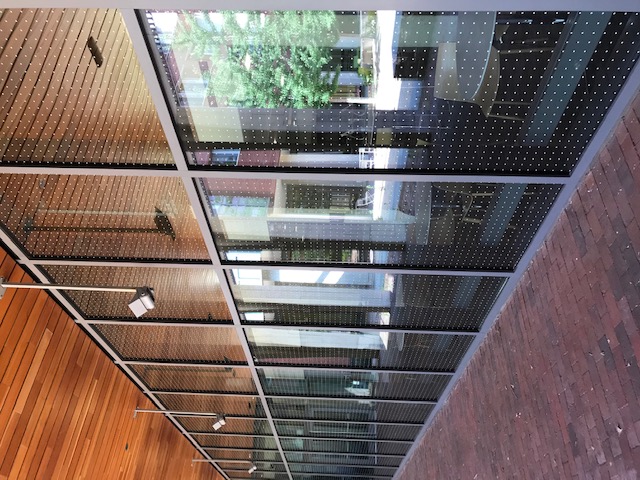 Creating bird-friendly buildings is one of three key elements of Audubon’s Bird-Friendly Communities program. Each year, as many as one billion birds in the US collide with windows and most of these birds die from their injuries. Reflective glass and bright lights that illuminate the built environment cause these collisions.
Creating bird-friendly buildings is one of three key elements of Audubon’s Bird-Friendly Communities program. Each year, as many as one billion birds in the US collide with windows and most of these birds die from their injuries. Reflective glass and bright lights that illuminate the built environment cause these collisions. 